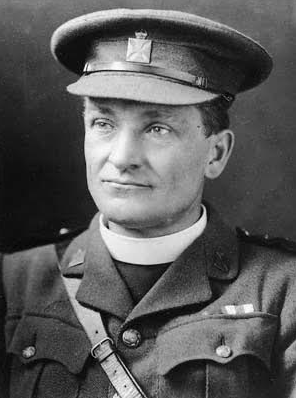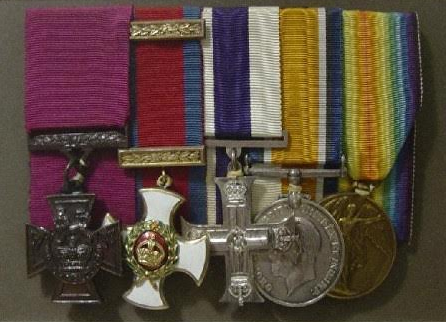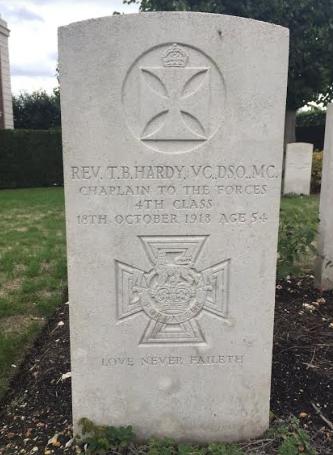'A reluctant hero'
The Revd Theodore Bayley Hardy was a quiet, unassuming 51-year-old vicar who became one of the most highly-decorated non-combatants of the Great War
 As the season of Remembrance approaches, 18 October 2018 marked the centenary of the death of the Revd Theodore Bayley Hardy, VC DSO MC, who died of wounds in France less than a month before the Armistice.
As the season of Remembrance approaches, 18 October 2018 marked the centenary of the death of the Revd Theodore Bayley Hardy, VC DSO MC, who died of wounds in France less than a month before the Armistice.
Although he became one of the most highly-decorated non-combatants of the Great War, this former school master was described by one of his pupils as, 'the last person you would expect to win a VC.' In 1914, Hardy was a quiet, unassuming 51-year-old vicar at Kirkby Lonsdale in the Cumbrian fells. Despite the sudden death of his wife shortly before the outbreak of war, Hardy applied to join the Army Chaplains' Department but was rejected several times due to his considerable age. He was eventually accepted into service after the war took its toll on the younger generation of Chaplains.
This slight, short sighted and somewhat eccentric figure (Hardy was also teetotal and vegetarian) finally deployed to France in the Autumn of 1916. He was initially sent as Chaplain to a transit camp on the channel coast of France but this was not enough for Hardy, who felt called to serve at the front. Determined to minister to the fighting men in the trenches, he persuaded the Army to allow him to join the 8th Battalion the Lincolnshire Regiment, at Vielle Chapelle in December 1916.
On his way to the front, Hardy had a providential encounter with another famous WW1 Padre, the Revd Studdert Kennedy, known to the troops as 'Woodbine Willie'. Kennedy's simple advice, which Hardy followed closely, was this: 'Live with the men. Go everywhere they go. Share all their risks and more if you can do any good. Take a box of fags in your haversack and a great deal of love in your heart. Laugh with them, joke with them; you can pray with them sometimes, but pray for them always.'
Hardy lived with the troops in the forward trenches, dodging the constant gun fire and sniping, handing out sweets and cigarettes, writing letters for the troops and helping carry the wounded to safety. Seeking to better earn the trust of the men, Hardy took to visiting them at night in the trenches, whilst conducting his chaplaincy duties by day. He often went without sleep and a visiting General once commented that Hardy appeared to be 'asleep on his feet' during his own service. During the Battle of Arras in April 1917, the Senior Chaplain found on several occasions that Hardy had been working continuously for 48 or even 36 hours and had to order him to bed.
On 31 July, the battle of Passchendaele began with an attack in which the 8th Battalion suffered 177 casualties of all ranks. All this time Hardy was with his men, helping the stretcher bearers extricate the wounded from the mud at night. After several nights he was reported missing and eventually found lying asleep in a sodden shell hole where he had collapsed from exhaustion. In October 1917 Hardy was awarded the Distinguished Service Order (DSO) 'for conspicuous gallantry and devotion to duty', while rescuing wounded men from no-man's land throughout the night, despite himself suffering a broken wrist.
This was followed by the award of the Military Cross (MC) in December 1917, for repeatedly going out under heavy fire to help the stretcher bearers during an attack.

In the spring of 1918, the Lincolns fought in the Somme, where Hardy's devoted and fearless actions on the 5th, 25th and 27th of April 1918 resulted in him being awarded the Victoria Cross (VC). On 27 April, he persuaded a Sergeant to help him rescue a wounded man who had fallen within 10 yards of an enemy pill box, the whole time under enemy fire. When told that he had been nominated for the VC Hardy said, "I really must protest".
Hoping to remove Hardy from further danger, the King suggested that he return home and become his chaplain. Likewise seeking to reward Hardy for his service, the Bishop of Carlisle offered him a Cumbrian parish with a magnificent rectory. But Hardy would have none of it; determined to stay with his men, he declined both offers and returned to his battalion.
On 10 October 1918, Hardy was hit by machine gun fire, as the Lincolns were crossing the river Selle by night. The first soldiers to reach Hardy remembered him saying quietly: 'I’ve been hit. I’m sorry to be a nuisance.' Hardy died on 18 October, three days before his 55th birthday and less than four weeks before the Armistice.
 Hardy was buried in the cemetery at St Sever, near Rouen and his medals are held by the Museum of Army Chaplaincy at Amport House.
Hardy was buried in the cemetery at St Sever, near Rouen and his medals are held by the Museum of Army Chaplaincy at Amport House.
Hardy's example was undoubtedly an inspiration to the men with whom he served. Private Jimmy Watson said of Hardy, 'He was always with us. He was always in the front line.'
The Commanding Officer, Colonel Sheringham said, 'I shall never forget the expression of the men when the news came that the Padre was dead.'
Hardy's example is also symbolic of the contribution of Army Padres in WW1. He was one of three Army Padres to win the VC, 67 who were awarded the DSO and a further 449 the MC; this latter figure includes 35 second awards of the MC (1st bar) and three third awards (2nd bar). Hardy is also one of 179 Army Chaplains were killed during the Great War. In recognition of their sacrifice, King George V conferred the prefix ’Royal’ on the Army Chaplains’ Department.
In this centenary year, several events have marked Hardy's service and the wider contribution of army chaplains in the Great War. In April 2018, a VC pavement stone was laid near Hardy's birthplace in Exeter, by the County Council and Army Chaplains' Department; this event was timed to coincide with his VC-winning actions in April 1918.
On Sunday 21 October, the Hardy VC Service was led by army chaplains at Hardy's former church at Hutton Roof in Kirkby Lonsdale; this service has been held in memory of Hardy every decade since October 1918. In addition, a new book commemorating Hardy's service has been released entitled, 'Theodore Bayley Hardy VC DSO MC: A Reluctant Hero'.
Over the weekend 9-11 November 2018, the Royal Army Chaplains’ Department will mark the end of the 100th-year commemoration of World War 1 with a tribute to the Revd Hardy at Salisbury Cathedral, as part of a wider exhibition on the role of Padres during the Great War. Serving chaplains will be on hand throughout the weekend to discuss the historical contribution of military chaplains and their roles in modern day service life.
This article was submitted on behalf of the Royal Army Chaplains’ Department
Baptist Times, 05/11/2018